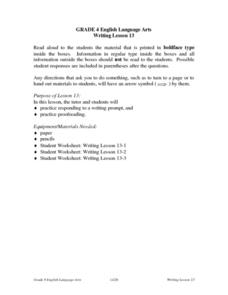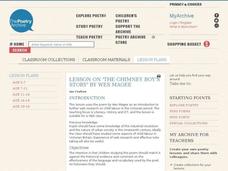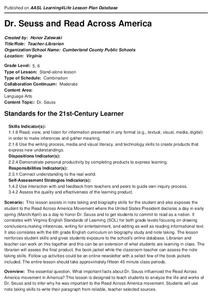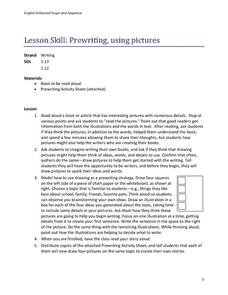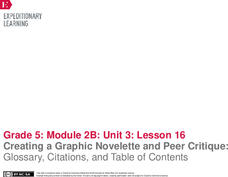Curated OER
Writing Lesson 13
Fourth graders practice responding to a writing prompt and practice proofreading. They write three paragraphs explaining good classroom rules and tell why each of three rules is a good one. Each paragraph should have at least three...
Curated OER
The Importance of Being Flexible and Open-minded as a Visitor to Another Culture: Lesson 2 For "The Train Ride Home"
Learners examine the advantages of being flexible when visiting or living in a different culture. They read and discuss a first-hand account by a Peace Corps volunteer in Kazakhstan, and write a letter from the point of view of a...
Teacher Vision
The Wampanoag Indians: A Thanksgiving Lesson
Spark some lively conversation about American holiday traditions and debunk accepted notions about the first Thanksgiving at the same time. After reviewing the mainstream version of the Thanksgiving story with your class, offer some...
Curated OER
Personal Narrative
Second graders create a graphic organizer on Kidspiration about themselves. They write a personal narrative using the information from their graphic organizer. They share their project with the class.
Curated OER
Integrative Lesson on Genres of American Literature (Senior, Literature)
To begin this lesson, the instructor will present a PowerPoint detailing the genres of Romanticism, Realism, and Naturalism. Learners will follow along with an instructional sheet that will aid in the identification of setting, tone,...
Curated OER
Lesson on 'The Chimney Boy's Story' by Wes Magee
Wes Magee's poem "The Chimney Boy's Story" about chimney sweeps/climbing boys is used as an introduction to a lesson that asks groups to research child labor in Victorian Britain.
Curated OER
The Extra Place Lesson
Students explore communication skills. In this Peace Corps lesson, students read "The Extra Place," by Susan Peters and discover Polish cultural traditions. Students consider how they would respond in a scenario that challenges their...
Virginia Department of Education
Determining Purpose and Audience
Build the writing skills of your junior high wordsmiths with activities that introduce many essential skills of writing. As a class, they develop working definitions of formal vs. informal writing, explore different categories of...
California Education Partners
Telescopes
An assessment challenges scholars to read an informative text then respond with an explanatory essay. The exam begins as participants read a text passage twice then take notes, making sure to jot down key details. Following the...
Curated OER
Dr. Seuss and Read Across America
What important facts about Dr. Seuss influenced the Read Across America movement...? This is the driving question of a research project that requires scholars to find information about Dr. Seuss' life and work. Class members write a...
California Education Partners
We Are The Ship
An assessment sheds light on scholars' ability to read, gather evidence, and draft an original written composition. Learners read an informative text twice before taking notes and discussing their thoughts and textual evidence with a...
EngageNY
Mid-Unit 3 Assessment, Part I: Short Constructed Response and Organizing Notes for a Public Speech
It's time to put pen to paper. Scholars complete the first part of the mid-unit 3 assessment, writing a short constructed response about international aid following a natural disaster. Next, pupils use informational texts and note...
EngageNY
Drafting Body Paragraphs
That's just the style. Learners begin with a mini-lesson about formal writing style. They then use what they learned about formal writing to begin the body paragraphs for their End of Unit 1 Assessment Prompt: Adversity in the Middle...
EngageNY
Reading Proficiently and Independently: The Power of Setting Goals
Scholars reflect upon their reading strengths and challenges to create personal reading goals. Participants use goal-setting verbiage in an accordion-style graphic organizer, a first step in writing a letter that details their reading...
California Education Partners
Frog and Toad Together by Arnold Lobel
A three-part assessment tests scholars' reading and writing capabilities. Young readers listen to and read an excerpt from Frog and Toad Together by Arnold Lobel. After drawing pictures of what is memorable, learners discuss their notes...
California Education Partners
My Five Senses by Aliki
An assessment designed to examine scholars' reading comprehension skills takes place over three days. Starting with a read-aloud of My Five Senses by Aliki, learners then take notes and discuss their most memorable moments with a peer....
John F. Kennedy Presidential Library & Museum
Picture It: JFK in High School
Elementary schoolers learn about young John F. Kennedy. After a teacher-led discussion about his high school years, pupils examine a photograph of Kennedy and four of his friends taken on the grounds of the Choate School in Connecticut....
Southern Poverty Law Center
Evaluating Reliable Sources
A lesson plan instills the importance of locating reliable sources. Scholars are challenged to locate digital sources, analyze their reliability, search for any bias, and identify frequently found problems that make a source unusable.
Boston Public Schools
What's in a Biography?
Reinforce research skills, close reading, teamwork, and biographical writing skills with one collaborative lesson. Groups create slide shows detailing the elements of a biography through a presentation on a famous American person. Based...
College Board
Evaluating Sources: How Credible Are They?
How can learners evaluate research sources for authority, accuracy, and credibility? By completing readings, discussions, and graphic organizers, scholars learn how to properly evaluate sources to find credible information. Additionally,...
EngageNY
Drafting Introduction and Conclusion
In conclusion ... Scholars analyze the model essay Adversity Faced by Townspeople in
the Middle Ages to gain a better understanding of introductory and concluding paragraphs. After studying the author's strategies, learners begin writing...
Curated OER
Prewriting, Using Pictures
Young readers practice getting information from both the text and the illustrations found in books they are reading. They see that quite often, authors use pictures to help them get their writing process started. Youngsters are invited...
EngageNY
Creating a Graphic Novelette and Peer Critique: Glossary, Citations, and Table of Contents
A, B, C ... let's alphabetize to get organized! Using the informative resource, scholars create an alphabetized glossary of key words for their graphic novelettes. Additionally, they create a table of contents and citations page.
EngageNY
Summarizing Complex Ideas: Comparing the Original UDHR and the "Plain Language" Version
The eighth lesson plan in this series continues the focus on vocabulary and increasing young readers' awareness of academic language. Pairs of learners participate in a short vocabulary review activity called Interactive Words in which...


